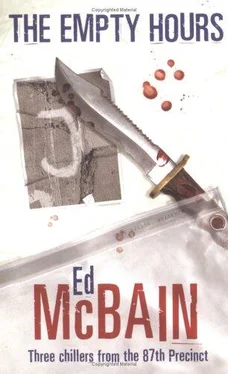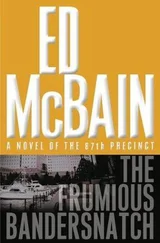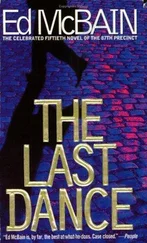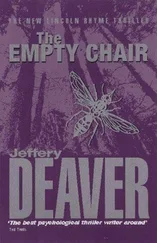“Yeah, my fingerprints! Am I gonna get involved in murder besides losing a day’s work?”
“I don’t think so,” Carella said, smiling.
“I shouldn’t have taken that job, anyway,” Cabot said. “I shouldn’t have even bothered with it.”
“Who hired you for the job, Mr. Cabot?”
“The priest did.”
“The rabbi, you mean?” Carella asked.
“Yeah, the priest, the rabbi, whatever the hell you call him.” Cabot shrugged.
“And what were you supposed to do, Mr. Cabot?”
“I was supposed to paint. What do you think I was supposed to do?”
“Paint what?”
“The trim. Around the windows and the roof.”
“White and blue?”
“White around the windows, and blue for the roof trim.”
“The colors of Israel,” Carella said.
“Yeah,” the painter agreed. Then he said, “What?”
“Nothing. Why did you say you shouldn’t have taken the job, Mr. Cabot?”
“Well, because of all the arguing first. He wanted it done for Peaceable, he said, and Peaceable fell on the first. But I couldn’t —”
“Peaceable? You mean Passover?”
“Yeah, Peaceable, Passover, whatever the hell you call it.” He shrugged again.
“You were about to say?”
“I was about to say we had a little argument about it. I was working on another job, and I couldn’t get to his job until Friday, the thirty-first. I figured I’d work late into the night, you know, but the priest told me I couldn’t work after sundown. So I said why can’t I work after sundown, so he said the Sabbath began at sundown, not to mention the first day of Peace— Passover, and that work wasn’t allowed on the first two days of Passover, nor on the Sabbath neither, for that matter. Because the Lord rested on the Sabbath., you see. The seventh day.”
“Yes, I see.”
“Sure. So I said, ‘Father, I’m not of the Jewish faith,’ is what I said, ‘and I can work any day of the week I like.’ Besides, I got a big job to start on Monday, and I figured I could knock off the church all day Friday and Friday night or, if worse came to worse, Saturday, for which I usually get time and a half. So we compromised.”
“How did you compromise?”
“Well, this priest was of what you call the Conservative crowd, not the Reformers, which are very advanced, but still these Conservatives don’t follow all the old rules of the religion is what I gather. So he said I could work during the day Friday, and then I could come back and work Saturday, provided I knocked off at sundown. Don’t ask me what kind of crazy compromise it was. I think he had in mind that he holds mass at sundown and it would be a mortal sin if I was outside painting while everybody was inside praying, and on a very special high holy day, at that.”
“I see. So you painted until sundown Friday?”
“Right.”
“And then you came back Saturday morning?”
“Right. But what it was, the windows needed a lot of putty, and the sills needed scraping and sanding, so by sundown Saturday, I still wasn’t finished with the job. I had a talk with the priest, who said he was about to go inside and pray, and could I come back after services to finish off the job? I told him I had a better idea. I would come back Monday morning and knock off the little bit that had to be done before I went on to this very big job I got in Majesta — it’s painting a whole factory; that’s a big job. So I left everything right were it was in back of the church. I figured, who’d steal anything from right behind a church. Am I right?”
“Right,” Carella said.
“Yeah. Well, you know who’d steal them from right behind a church?”
“Who?”
“The cops!” Cabot shouted. “That’s who! Now how the hell do I get my ladder back, would you please tell me? I got a call from the factory today. They said if I don’t start work tomorrow, at the latest, I can forget all about the job. And me without a ladder!”
“Maybe we’ve got a ladder downstairs you can borrow,’ Carella said.
“Mister, I need a tall painter’s ladder. This is a very high factory. Can you call this Captain Grossman and ask him to please let me have my ladder back? I got mouths to feed.”
“I’ll talk to him, Mr. Cabot,” Carella said. “Leave me your number, will you?”
“I tried to borrow my brother-in-law’s ladder — he’s a paper hanger — but he’s papering this movie star’s apartment, downtown on Jefferson. So just try to get his ladder. Just try.”
“Well, I’ll call Grossman,” Carella said.
“The other day, what she done, this movie actress, she marched into the living room wearing only this towel, you see? She wanted to know what —”
“I’ll call Grossman,” Carella said.
As it turned out, he didn’t have to call Grossman, because a lab report arrived late that afternoon, together with Cabot’s ladder and the rest of his working equipment, including his brushes, his putty knife, several cans of linseed oil and turpentine, a pair of paint-stained gloves and two dropcloths. At about the same time the report arrived, Grossman called from downtown, saving Carella a dime.
“Did you get my report?” Grossman asked.
“I was just reading it.”
“What do you make of it?”
“I don’t know,” Carella said.
“Want my guess?”
“Sure. I’m always interested in what the layman thinks,” Carella answered him.
“Layman, I’ll give you a hit in the head!” Grossman answered, laughing. “You notice the rabbi’s prints were on those paint-can lids, and also on the ladder?”
“Yes, I did.”
“The ones on the lids were thumb prints, so I imagine the rabbi put those lids back onto the paint cans or, if they were already on the cans, pushed down on them to make sure they were secure.”
“Why would he want to do that?”
“Maybe he was moving the stuff. There’s a tool shed behind the synagogue. Had you noticed that?”
“No, I hadn’t.”
“Tch-tch, big detective. Yeah, there’s one there, all right, about fifty yards behind the building. So I figure the painter rushed off, leaving his junk all over the back yard, and the rabbi was moving it to the tool shed when he was surprised by the killer.”
“Well, the painter did leave his stuff there, that’s true. He expected to come back Monday morning.”
“Today, yeah,” Grossman said. “But maybe the rabbi figured he didn’t want his back yard looking like a pigsty, especially since this is Passover. So he took it into his head to move the stuff over to the tool shed. This is just speculation, you understand.”
“No kidding?” Carella said. “I thought it was sound, scientific deduction.”
“Go to hell. Those are thumb prints on the lids, so it’s logical to conclude he pressed down on them. And the prints on the ladder seem to indicate he was carrying it.”
“This report said you didn’t find any prints but the rabbi’s,” Carella said. “Isn’t that just a little unusual?”
“You didn’t read it right,” Grossman said. “We found a portion of a print on one of the paintbrushes. And we also —”
“Oh, yeah,” Carella said, “here it is. This doesn’t say much, Sam.”
“What do you want me to do? It seems to be a tented-arch pattern, like the rabbi’s, but there’s too little to tell. The print could have been left on that brush by someone else.”
“Like the painter?”
“No. We’ve pretty much decided the painter used gloves while he worked. Otherwise, we’d have found a flock of similar prints on all the tools.”
“Then who left that print on the brush? The killer?”
“Maybe.”
“But the portion isn’t enough to get anything positive on?”
Читать дальше












